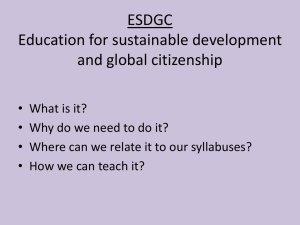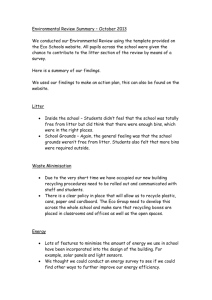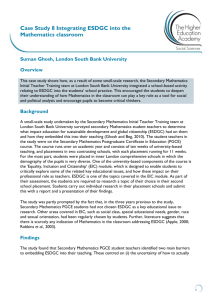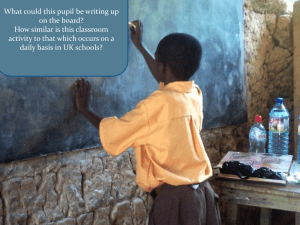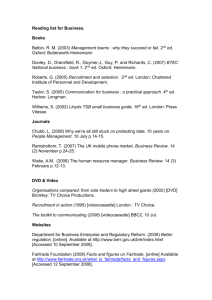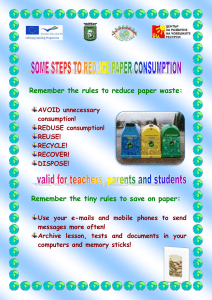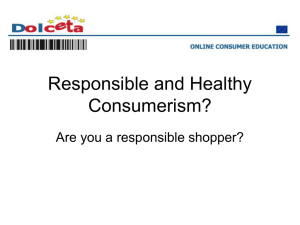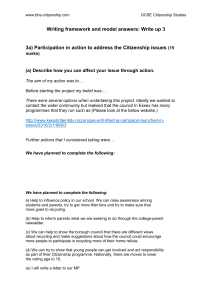EDUCATION FOR SUSTAINABLE DEVELOPMENT & GLOBAL
advertisement
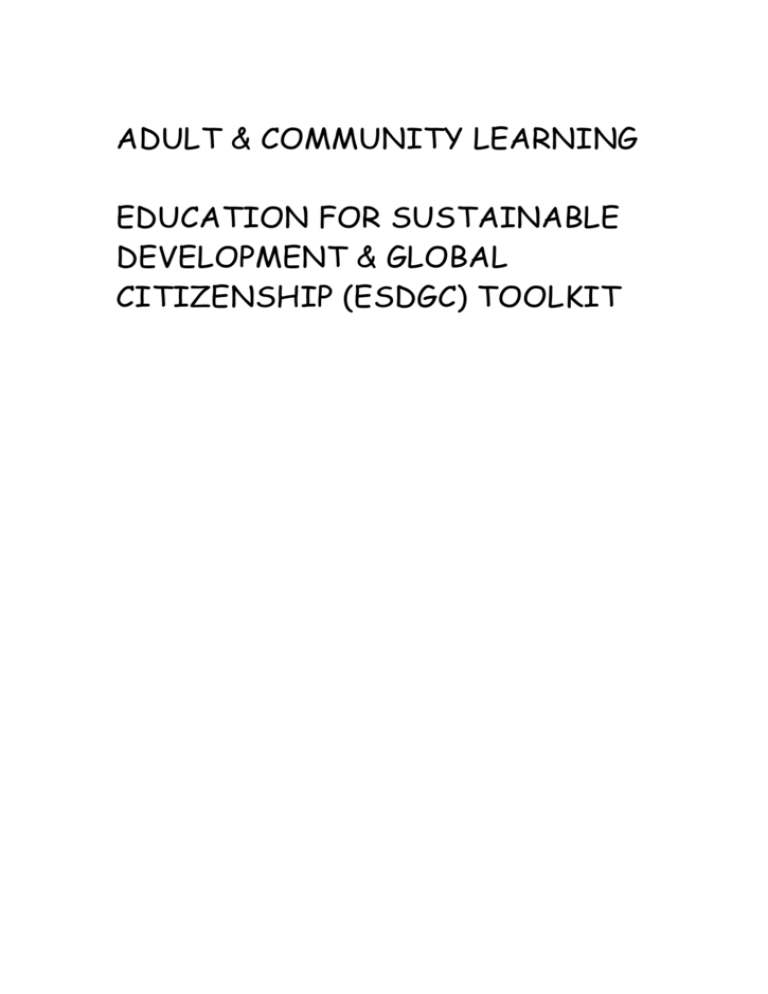
ADULT & COMMUNITY LEARNING EDUCATION FOR SUSTAINABLE DEVELOPMENT & GLOBAL CITIZENSHIP (ESDGC) TOOLKIT CONTENTS SECTION ITEM PAGE 1 What is Sustainable Development & Global Citizenship? 3 2 Importance of ESDGC 4 3 ESDGC in Adult & Community Education 5 4 The seven themes of ESDGC 7 5 Examples Of ESDGC In Key Subject Areas 9 6 How to be Sustainable at Work 15 7 How to be Sustainable at Home 17 8 Planning Sustainable Events 18 9 Sustainable Travel 21 Bimonthly Themes Energy & Water Waste Minimisation Transport Health Climate Change Buying Locally 22 11 Resources Available 28 12 Glossary of ESDGC Terms 31 10 2 SECTION 1 What is Sustainable Development? “The goal of sustainable development is to enable all people throughout the world to satisfy their basic needs and enjoy a better quality of life, without compromising the quality of life of future generations.” What is Education for Sustainable Development & Global Citizenship? “Education for Sustainable Development & Global Citizenship (ESDGC) enables people to develop the knowledge, values and skills to participate in decisions about the way we do things individually and collectively, both locally and globally, that will improve the quality of life now without damaging the planet for the future.” UK panel for ESDGC, Welsh Assembly Government Education for Sustainable Development & Global Citizenship is about: The links between society, economy and environment and our own lives and those of people throughout the world. The needs and rights of both present and future generations. The relationship between power, resources and human rights. The local and global implications of everything we do and the actions that individuals can take in response to local and global issues. It’s not an individual subject, it’s an ethos that can be embedded through a subject, an attitude to be adopted and a new way of life. Why develop an ESDGC Adult Community Learning toolkit. The Education for Sustainable Development & Global Citizenship Toolkit for Adult Community Learning has been developed to support ACL managers incorporating ESDGC into the ethos, pedagogy and organisation of the network and to support tutors incorporating ESDGC into their work programme and subject areas. The ESDGC Toolkit for Adult Community Learning has been developed by the CCBC Education for Sustainable Development Officer with support from the ESDGC Youth & Adult Steering Group. We wish you every success in using this toolkit. If you require any additional information please contact Tracy Evans at EVANSTA@caerphilly.gov.uk 3 SECTION 2 Importance of Education for Sustainable Development & Global Citizenship Education for Sustainable Development & Global Citizenship (ESDGC) can be about energy usage, water usage, travel & transport, waste minimisation and recycling, environmental management, local areas & the local environment, management of grounds, quality of life, health and well being, life satisfaction, life expectancy, work life balance, buying locally, Fairtrade, food miles, race equality, prejudice, discrimination, cultural diversity, music/ arts, biodiversity, ecology, healthy living, thinking about the causes & consequences of actions, consuming less resources, health & safety, involvement in your local community, volunteering and much much more. Everything we do has an impact on the world around us. The individual choices we make in our everyday lives have implications for the environment, society and economy. We’re running out of space, creating more waste, running out of natural resources, consuming more and more and over consuming in richer countries while the poverty increases in the poorer countries. We need to be mindful of what we buy and consume on a day-to-day basis to ensure we support local businesses and Fairtrade where possible. Our use of fossil fuels is creating an increase in the levels of Carbon Dioxide in the atmosphere, contributing to the climate change. Sustainability isn’t just about large projects and plans. Everyone can contribute by making small but significant changes in the way they live and work. 4 SECTION 3 Education for Sustainable Development & Global Citizenship in Adult & Community Education: ESDGC should be viewed in a holistic way and mainstreamed into the practice and running of the whole institution or organisation so that sustainable development and global citizenship are part of the whole ethos. ESDGC should be incorporated into the training programmes for adult education for both part time and full time staff. Key actions should focus on raising awareness at a strategic level and through training to all course planners. ESDGC needs to be mainstreamed into the practice and management of the educational establishment. It should be embraced within all aspects of work, pedagogy, research and infrastructure. ESDGC should be incorporated into the strategic planning with the aim of embedding it into adult education courses. Opportunities for networks to support ESDGC in adult education include: Recommendations for the Adult & Community Education Sectors ESDGC can be split into 5 areas to ensure it is taken forward in a strategic approach, which is detailed in the Welsh Assembly Government ESD & GC Strategy. These 5 key areas are commitment and leadership, teaching and learning, institutional management, partnerships and research and monitoring. Examples of each are shown below: Commitment & leadership Adult Education – Develop guidance to incorporate ESDGC into various subject areas. Community Education – Guidance to embed ESDGC in all areas. Teaching & learning Adult Education – Incorporate into tutor’s training programme, ESDGC guidance for tutors. Community Education – Integrate ESDGC into subject areas, raise awareness and understanding of ESDGC to tutors. Institutional management Adult Education – Needs a holistic approach, develop sustainable environmental management system (improve sustainability of institution), curriculum planning to improve energy efficiency. Community Education – Sustainable management (waste management/ recycling/ use of buildings & materials/ sustainable procurement/ transport/). 5 Partnerships Adult Education – Raise awareness of ESDGC to all members, connect with local/ global issues and develop links with officers providing support on ESDGC. Community Education – Develop partnerships with external ESDGC specialists to help them develop internal projects/ initiatives. Research & monitoring Adult Education – ESDGC audit, future targets, long term plans. Community Education – Audit of ESDGC provision, future planning to expand ESDGC awareness and understanding. What does ESDGC actually mean for Adult Community Learning Centres? For students, ESDGC is about: Being encouraged to care for themselves, care for each other and care for their environment. The issues they have a right to know about for their future. Appreciating their role in the community (locally and globally). Discovering that there are connections to the ‘bigger picture’ of the wider world, whatever they are studying. Gaining skills and exploring issues so they can make up their own minds about how to act in their personal and professional lives. For tutors, ESDGC is about: A holistic approach to education. Preparing learners for new challenges. Developing learner’s worldviews to recognise the complex interrelated nature of their world and the world of work. An approach to teaching and learning to which every subject/ course can contribute. Build skills to enable learners to think critically and laterally for themselves. For Centre managers, ESDGC is about: Part of the ethos, pedagogy and organisation of the centre. How the centre is run and managed. Something that requires centres to ‘DO’ as well as ‘TEACH’. Something that requires coordination across the whole centre. Something that ESTYN will look at as part of the inspection framework. Undertaking an audit to identify current ESDGC activity and examine opportunities to expand ESDGC into all curriculum areas. Incorporate ESDGC into the tutor handbook and training sessions. Putting systems, policies and procedures in place to manage environmental impacts. 6 SECTION 4 The seven themes of ESDGC and an example of the issues associated with them. Identity and Culture Personal and regional histories Welsh heritage and language How identities and cultures influence actions and communities The impact of cultures in Wales and other places Challenging stereotypes Recognise that people hold different values Recognise and challenge discrimination and prejudice in an appropriate way Peaceful resolution of differences The Natural Environment Biodiversity Endangered species Conservation and restoration of habitats Human dependence on eco systems and the interdependence of eco systems The impact of human activity including conflicts on the natural environment, gene banks and genetic modification Stewardship of resources and habitats The role of the natural environment in relation to quality of life Wealth and Poverty Levels of wealth and poverty The gap between the rich and poor, locally and globally Quality of life – is it improved by money The interdependent causes and impacts of poverty Mitigation How wealth is created and perceived, including the real value of goods, services and relationships Globalisation, Fairtrade The right of future generations to access resources Health The importance of caring for yourself and for others The relationship between health and quality of life Nutrition and sources of food The impact of drug abuse on individuals and others The value of different relationships including family, sexual and professional The impact of the environment on health The importance of access to clean water 7 Climate Change The scientific evidence relating to climate change The greenhouse effect Global warming The causes of climate change The potential impacts and the uncertainty of predictions Preventative and adaptive responses The impact of the individual and the community The impact on future generations Consumption and Waste Renewable and non renewable resources Energy, food and water, sustainable design and sustainable materials The waste hierarchy Ecological footprints Supply chains, transport, pollution The rights of future generations to a good quality of life Advertising and peer pressure Quality of life versus standard of living Reassessing values Resolving conflicts over resources Choices and Decisions Democratic and non-democratic decision making at different levels from different groups How to participate in decision making at different levels How to present a point of view The interconnected consequences of decision making The role of governments and how to be a participant in a civil society 8 SECTION 5 Examples Of ESDGC In Key Subject Areas The following are examples of how ESDGC can be incorporated into a variety of subject areas. The list is not exhaustive, the aim is to embed ESDGC into what you are already doing instead of looking at it as an ‘add on’ subject. Art & Crafts: Design and Technology: Students’ have the opportunity to design and create products and consider how certain products affect peoples’ lives. Compare current designs to designs used years ago, looking at the differences, reasons why and possible implications on the community, economy and environment. Students can learn about renewable and non-renewable sources of materials, the lifecycle of certain products and the level of energy used and waste produced in the manufacturing process. Investigate how a local area could be managed sustainably. Art/ Pottery/ Dress Making: Studying art provides students with opportunities to use different media, tools and equipment to explore and make different images, objects and artefacts, and to understand the importance and diversity of different social and cultural contexts. Students can experiment with recycled and reused materials, they can develop their own painting materials using natural materials and they can create visual art to promote sustainable lifestyles. Discussions can contribute to teamwork, communication and conflict skills. Music: Music has the potential to contribute to global citizenship if tutors plan a rich diet or repertoire of music from around the world. Students relate music, where appropriate, to its social, historical and/or cultural background. Understanding that music moves people, respecting diversity (and similarity) of music across cultures and traditions. Could have the opportunity to express their feelings about issues through music. Social benefits of participating in a musical group activity. Photography: Provides the opportunity to capture images portraying sustainable development & global citizenship. Students can capture images of local areas, which could be used for topical environmental or sustainable discussions. Images could be used to monitor the sustainability of the centre over a specific time period. An image can be used to encourage people to change their behaviour. 9 Sport/ Exercise: Promoting health and well-being. Engaging with local groups and communities and promoting the benefits of leading an active lifestyle. Encourages individuals to participate in teamwork and engage with people of different ages and backgrounds. Helps keep the body and mind active. Languages: Local and global issues can be incorporated into various language courses. Students can develop an understanding of the countries and communities that speak the language being taught. They can use authentic materials, interact with local communities, find out more about the culture and communicate with native speakers. Respecting and valuing other peoples’ languages, values and ways of life. Hairdressing: Safe storage and disposal of chemicals. Consequences of incorrect disposal and the effect it can have on the environment. Use, storage and disposal of products including aerosol sprays, exploring more environmentally friendly options. Monitoring resources such as paper and other materials that could be recycled. Legal and financial rights and responsibilities. Precautions or safety measures which should be taken in a working environment, how to work safely and within the law. Supporting community (might be the only contact some people have). Information and Communication Technology: Students can develop the skills and understanding to prepare themselves for involvement in a rapidly changing world. Students can investigate the ways in which IT is driving new forms of globalisation and global communication and understand the impact of IT on the world. Innovative technologies to reduce carbon footprints. Green IT and sustainable computing technologies. Mobile working technologies. Recycling and reuse of equipment. Impacts of ICT on individuals, communities and society. Ethical implications of access to and use of ICT. Construction, Planning and the Built Environment New build housing, zero carbon from 2016 – green and energy efficient homes. Energy efficient buildings. Energy conservation. 10 Alternative energy sources. Waste management. Water use and conservation. Use of sustainable building materials. Adult Basic Skills: Business Studies: Students can appreciate the perspectives of a range of stakeholders in relation to the environment, individuals, society, government and enterprise. Environmental, cultural and ethical issues can be considered when looking at opportunities and constraints in the business environment. Students can investigate the issues surrounding Fairtrade and trade justice within the local and global economy. Managing commercial and industrial development within tight environmental constraints. Managing intangible assets. Impact of exchange rates. Ethics of business, ethical banking and investments. Influence on the wider economy. Social and environmental impacts. Hospitality and Catering: Students have the opportunity to learn about citizenship issues including multicultural influences on food, menu planning to use local organic produce in season, Fairtrade products, packaging and disposal of waste items. Students could incorporate energy and water usage and menu planning to reduce their energy usage and reduce food waste. Research and create menu’s to promote other countries and cultures. Students could research the background to certain menu’s and the importance of certain cultures/ religions. Use creative menu planning to promote health and well being to staff, students and the local community. Sustainability issues in food production and consumption. Students can investigate where food items come from, the food miles of different products and possible alternatives to reduce the number of food miles of certain meals/ menus. Menus could promote food miles and calorific/ fat information to make people aware of the food they are purchasing, the health benefits of the items and where it comes from. Sustainable issues in food production and consumption. Energy consumption and CO2 emissions through processing and transportation. Diet and health. Wages, staff turnover and reliance on migrant workers. 11 Leisure & Tourism: Students can learn about how leisure and tourism facilities can be developed in a sustainable way and how they contribute towards developing citizenship and stewardship by creating communities. They can look at different tourism destinations and the impact of tourism on these places. They can develop empathy for different cultural needs and identify how these needs can be catered for within the leisure industry. Sustainable tourism – What are the impacts of tourism on a local community. Health, diet and nutrition and exercise. Teamwork, competition, sport and identity. Safe and ethical environments. Organising sporting events – exploring issues of maintenance, refreshments, transport, lighting, production of equipment and health and safety assessments. Exploitation in tourism, ensuring tourism benefits local people. Global dimensions of tourism. Heritage and cultural tourism. Countryside visits set against conservation and prevention issues for future generations. Experience of emerging destinations, first hand experience of the impacts of tourism in less wealthy countries. Engineering New technologies, prototypes and processes. Use of materials and their impact on the environment. Recycling/disposal of materials. Legislation and health and safety issues. Use of non-renewable resources and renewable resources. Energy/ resources. Examining vehicle emissions, transport fleets. General Education: Geography: Studying geography widens and deepens student understanding of people, places and environments and how geographical patterns and processes change over time and place. Students learn about global, environmental, social and economic issues and the impact they have on peoples lives. Understanding the complex relationship between human development and the global environment. Planning for a sustainable future – how can you meet the needs of the community in a protected area. 12 History: Students can explore and widen their knowledge and understanding of different historical periods and their influence on life today; They can look at how and why events and people have been interpreted in different ways. They can consider the causes and consequences of historical events and the connections between them. Students can learn about exploration and migration, social and economic life during industrial times and local history using local resources. English: Students can read, discuss and write about sustainable development issues, to empathise with local and global, social, economic and environmental issues. Students can recognise the values and attitudes that are behind the use of language. Students could discuss the complex pressures preventing people from living a healthy lifestyle. Biology / Chemistry / Physics: Science develops students’ understanding of the complex relationship and interdependence between human beings and the world around us. Students can study and understand chemical and physical processes, energy transfers, chemical and geological change, pollution, renewable and non renewable energy and biological diversity. An awareness of how and why decisions are made about applications of science, and the social, economic and environmental effects of these decisions. Tutors Embedding ESDGC Reflect on and develop own understanding of ESDGC throughout professional practice. Understand that learners may have different starting points and a varied understanding of the various strands of ESDGC, and work to promote understanding across all aspects of ESDGC. Motivate learners through valuing the importance of learner experiences and aspirations. Take account of the ways in which sustainable development and global citizenship impact on the subject studied. Explore the use of terminology relating to ESDGC. Aim to embed ESDGC into your curriculum programme instead of including it as an extra topic. Think about what you are teaching and how ESDGC relates to it/ fits in to your scheme of work. ESDGC will fit into everything – do you use recycled paper / recycled/ reused materials in class, do you travel to class sustainably and do you encourage your students to do the same, are resources used only 13 when required (are the lights on when the blinds are shut to keep the sun out, are lots of handouts printed when they could be emailed), are students encouraged to behave and act sustainably. Is the centre managed sustainably – Are courses planned to maximise the use of the centre on certain days or is the building being heated every day for one class each day. 14 SECTION 6 How To Be More Sustainable At Work? Money saving tips that wont cost the earth to help you be more sustainable at work. Travelling to work Explore the options of using public transport to commute to work, even once a week. Encourage the students to use public transport or lift share to lessons and events. Include public transport details and cycle/ walking routes in course information. If you do drive to work try to share your journey with colleagues who live near you or on your route. Even car sharing once a week helps make a difference. Travelling in work Chose locations for meetings and events that are close to public transport routes and with the most minimal travel for all. Offer your availability to car share when arranging meetings and events. Explore your local leisure and cultural facilities for site visits. Leisure and cultural activities give us a sense of well-being but also develop a sense of pride in our community and our sense of place. Energy & Water: Think about your energy usage when planning timetables and events. It’s better to heat and light a full building than to heat and light several half empty buildings. Switch off your computer, including the monitor if you are away from your desk for more than 30 minutes. Turn off lights where possible, especially if you are the last to leave the room. Put stickers above the light switches to encourage everyone to turn them off when they leave the room. Try not to leave anything on standby, switch things off at the mains. Turn down the heating before a room becomes to hot and before windows are opened. Only boil the amount of water needed when using the kettle. Ensure that external doors are closed to keep the heat in. Reduce, Reuse, Recycle: Remember to recycle paper, plastic bottles and cans. Set up a recycling scheme at your education centre. Encourage everyone to use a china cup instead if using disposable plastic cups. Reuse envelopes and have a paper scrap store for notes and draft work. 15 Set your printer to print on both sides of the paper. Bring your packed lunch in a reusable sandwich box instead of using disposable items such Clingfilm or foil. Avoid giving out unnecessary handouts during lessons and events. Delivering your Work Programme Try to achieve a Whole Adult Education and Community Education Approach to ESDGC. Implement the principles of ESDGC into your lessons, discussions, events, meetings and professional development where possible. Link with your local community and develop partnerships with officers/ groups and organisations that can support your delivery of ESDGC. Maintain the learning environment in a way as to demonstrate good ESDGC practice. Purchasing: If you are responsible for purchasing, aim to adopt and apply the principles of sustainable purchasing (buy recycled paper). When purchasing goods or services or booking venues think about the use of local suppliers and ethical and environmental considerations. Health: Incorporate health and well being and active projects into your work programme where possible, this will help improve your quality of life and general well being as well as encouraging students to take an interest in leading healthy lifestyles. Use your lunch break wisely, go for a healthy walk and reap the benefits of fresh air and exercise. Go for a swim or try a lunchtime workout at your local leisure facility. You could pair up with a friend and motivate each other to become healthier. If you are providing refreshments for meetings or events try to offer healthy options. Try to choose the healthy option in the canteen. Try to do a form of exercise that raises your heartbeat for at least 30 minutes every day. 16 SECTION 7 How To Be More Sustainable At Home? You can also save money at home by being more sustainable. Save Energy Switch off all lights and electrical appliances when not in use. Leaving your TV on standby uses a quarter of the power. Choose energy efficient appliances and light bulbs. Turn your thermostat down by 1.C - this can save you up to 10 per cent on your heating bill. Keep lids on pans when cooking to prevent your cooker having to work extra hard. Let clothes dry naturally rather than use a tumble drier. Save Water Don’t leave the tap running while you clean your teeth. Take a shower instead of a bath, it will save water and energy. Fix dripping taps - they can waste up to 13 litres of water a day. Use a water butt to collect rainwater for your plants. Reduce, Reuse, Recycle: Take part in your local recycling scheme Store food and other products in ceramic containers rather than foil or plastic wrap. Share magazines with friends and pass them on to the doctor, dentist or local hospital for their waiting rooms. Recycle as much as you can - contact your local council. Give unwanted clothes, toys and books to charity shops or jumble sales. Shopping Buy fresh produce in season and support local growers and farmers. Choose products with as little packaging as possible. Take your own bag, a ‘bag for life’ or reuse plastic bags. Buy produce from Fairtrade companies that don’t exploit third world companies. Walk or use public transport to travel to the shops. Shop locally – cut down on pollution and trasport costs. Aviod disposable varieties of products, usch as cups, plates, cutlery, pens, drinks, containers, razors, dusters and towels. 17 SECTION 8 Planning Sustainable Events The principles of planning a sustainable event can be applied to any meeting, there are likely to be sustainability issues around even two people getting together for a meeting. The key areas to focus on for a successful sustainable event are: Location & Venue Transport Waste Management Sustainable Food Materials Location & Venue Picking a venue that has accessible links to public transport reduces the need for delegates to travel by car and reduces CO2 emissions. To be accessible to all the venue needs to fulfil all the requirements to be DDA compliant (accessible toilets, ramps or level floors, hearing loops etc). Other things to consider are childcare facilities, quiet areas catering for different cultures and if the venue operates sustainably. Transport The key is to choose a venue with accessible routes for public transport, bicycle parks and pedestrian access. Encourage attendees to travel sustainably by providing clear information about public transport, bicycle parks and pedestrian access. You could also circulate a delegate list to encourage car sharing. If you are providing transport for your delegates consider environmentally friendly options where possible, even if it’s having one drop off and pick up point instead of lots of individual journeys to the same location. Waste Management The best way of dealing with waste from your event is not to create any in the first place! The waste hierarchy; REDUCE, REUSE, RECYCLE needs to be followed to ensure you deal with your waste sustainably. Make sure your attendees apply the ‘3Rs’ too. Reduce Make sure that you use glasses, cutlery and crockery instead of disposable plastic items. Avoid food served in individual wrappers like sugar sachets or individually wrapped sandwiches. 18 Only provide handouts on request and if you do need to use them, make sure they’re double sided. Reuse Hire as many of the materials and products needed for your event as possible rather than buying new. If name badges are required, use reusable plastic holders and recycled paper inserts – and make sure that participants return them on their way out. Put the delegate pack in a reusable holder or cotton bag. If you’re providing freebies, think about offering sustainable and reusable ones, like bioplastic or recycled plastic pens. Are your signs, displays and freebies reusable? Do they date easily? It’s much easier on your budget and the environment to make exhibition materials reusable. Recycle Make sure you have lots of recycling bins, with clear signage and in convenient locations to encourage delegates and exhibitors to recycle. It’s also worthwhile purchasing recycled products for your event, such as paper for handouts, to close the recycling loop. Sustainable Food Buy local food in season to support the local economy and reduce food miles. Buy organic and Fairtrade products where possible, even if you only provide Fairtrade tea and coffee at your event. Try to provide a healthy menu. Offer healthy food such as mixed salad bowls, pasta, jacket potatoes instead of chips, a fruit bowl for desert instead of cakes and pastries. Provide a good mix of vegetarian, vegan and fish products as well as meat-based products to cater for everyone. Think about the amount of food you order and try not to order too much. Millions of tonnes of food waste is sent to landfill each year. Use tap water instead of purchasing bottled water. Materials Reduce the amount of paper required by sending the information out electronically. Provide a checklist of extra materials that delegates can have emailed after the event. Your printed materials should be produced on recycled and / or naturally derived materials. Paper and card should be 100% postconsumer recycled. All printed materials must have a print size and style, of at least 12 point, Arial. Minimise white space and observe contrast and colour schemes that promote a high standard of accessibility. Designs should aim to conserve paper resources, by double-sided printing. 19 All materials produced should include environmental information regarding materials and production, it’s important that your participants know that you take environmentally friendly credentials seriously. 20 SECTION 9 Sustainable Travel Emissions from transport are the fastest growing contributor to climate change... Unless action is taken to cut road spending and invest more in public transport, transport will be the biggest CO2 contributor in the next ten years. In the modern world we are so used to going where and when we want that we don’t stop to think about the consequences of our journey. Sustainable transport includes walking, cycling, using public transport, car sharing and using vehicles that minimise carbon emissions, such as electric, LPG, biodiesel and hybrid cars. Transport Walk, cycle or use public transport where possible instead of taking the car or minibus – its better for the environment and healthier for you and the young people. Encourage the students to walk to College/ work and events. Encourage the students to use public transport or car share where possible. Explore your local leisure facilities. Explore your local area for field trips/ projects. Visit your local country park and find out what activities are being run during the year. Local bus/ train timetables are available on the CCBC website. 21 SECTION 10 Bimonthly Themes for ESDGC Run a bimonthly theme to engage everyone in ESDGC throughout the year. January/ February: Energy & Water Top Tips: Switch off all appliances when not in use. Always turn the light off when leaving the room. Ask yourself the question – Do you really need the light on or is there enough daylight? Take a shower instead of a bath. Only fill the kettle with the amount of water needed. Ensure that external doors are closed to keep the heat in. Activities for your work programme: Undertake an energy audit of your education centre and run a promotional campaign to encourage people to switch off. Install water hippos into the toilet cisterns – this can save between 2.5 and 3.5 litres of water each time the toilet is flushed. Design and make solar powered cars and donate them to your nearest primary school. Design and build mini wind turbines and undertake a study of your local area to find out the best locations for wind turbines. Calculate the energy usage of the catering department or the energy requirement of a certain meal/ menu. Plan the education schedule to minimise the use of buildings to reduce heating and electrical costs. Install renewable technology on the centre where possible. 22 March/ April: Waste Minimisation Top Tips: Reduce the amount of rubbish you throw in the bin each week. Use reusable shopping bags instead of disposable carrier bags. Avoid buying disposable items for events and activities. Encourage the staff and students to share books and magazines – you could even set up a swap shop library at your education centre. Aim to only buy what you need and avoid throwing away any food items for one month. Avoid buying over packaged items, such as Easter eggs, fruit and vegetables. Try to purchase items in bulk packaging instead of buying individual sachets. Activities for your work programme: Set up a recycling scheme at your education centre. Encourage the Art & Crafts Department to only use reused or recycled materials. They could design and build a go-kart or a wormery for the local school/ allotment society. Build a composter and set up a composting scheme at your education centre. Monitor the food waste from the catering department/ canteen and identify ways to reduce the waste produced. Encourage all tutors/ students to reduce and reuse their materials/ waste. Look at reusing materials for arts/ crafts/ pottery or examining where materials are purchased/ produced. Work to become a ‘zero waste’ centre. Create sculptures using reused/ recycled materials. Design sculptures to promote the sustainable development message. 23 May/ June: Transport Top Tips: Plan ahead, organise your day/ event around walking/ cycling/ using public transport. Use your local leisure facilities instead of travelling large distances to sites outside the county borough. Have a car free day once a week. Walk or cycle for short journeys instead of using the car. Think – do you really need to make the journey. Activities for your work programme: Encourage everyone to cycle/ walk/ use public transport to attend lessons, meetings and events during May and June. Encourage staff and students to take part in a sponsored walk or cycle. Set up a pool bike scheme. Set up a staff/ student cycle club. Research transport journeys and miles travelled as part of the curriculum. Develop a travel plan for each centre to reduce transport emissions and the centre’s impact on climate change. 24 July/ August: Health Top Tips: Find an active buddy, activities are always more fun when there’s more than one of you. Go for a walk during your lunch break or hold one of your lessons or meetings outdoors. Walk or cycle to lessons, events and meetings instead of using the car or public transport. Each five portions of fruit and vegetables each day. Relieve stress by doing relaxation techniques for at least 10 minutes each day. Give up a bad habit (drink less, give up smoking). You could encourage everyone to give up one bad habit for the same month to support each other. Activities for your work programme: Take part in one of the countryside walking events. Encourage the students to take up a new hobby/ activity. Encourage staff and students to engage in voluntary activity. Take part in a sponsored cycle event to raise money for charity whilst getting active. Incorporate health into the curriculum subject – healthy eating/ exercise, mental health and well-being. If possible take the curriculum outside, hold your lesson in the grounds, perhaps using natural materials for art and design, capturing nature in photography and promoting local attraction within leisure and tourism. Looking at racism and equality issues. Run sporting events with the local community/ local schools to raise money for charity. Engage with students in construction to repair footpaths and develop interpretation signs with the local community/ school. 25 September/ October: Climate Change Top Tips: Walk, cycle or use public transport to travel to your lessons, meetings and events instead of using the car. Explore your local leisure facilities instead of travelling great distances for site visits. Buy food and drink locally and in season or buy Fairtrade items where possible. Try to plan the catering for events and meetings using local and Fairtrade produce. Car share to travel to work. Start a compost heap. Reduce, reuse and recycle your waste. Activities for your work programme: Monitor your energy usage and run an awareness raising campaign to encourage people to switch off and use less energy. Undertake a travel survey to see how many staff and students drive, use public transport or walk/ cycle to lessons, events and meetings. Encourage everyone to sign a pledge to cycle/ walk/use public transport or car share for a month. Investigate renewable energy technologies as part of design and technology, science and tourism. Compare our lifestyles compared to those years ago and our impact on climate change – link to a variety of curriculum subjects. 26 November/ December: Buying Locally Top Tips: Visit and support your local farmers markets. Think before you buy, do you really need it. Walk to your local shops instead of driving to the supermarket Avoid buying disposable items. Buy sustainable presents and avoid purchasing disposable items. Only buy what you need. This will reduce the amount of food you waste. If you have small children buy reusable nappies instead of disposable nappies. The average child uses up to 5,000 nappies on their way to being potty trained. Check out the real nappies website www.realnappies-wales.org.uk for more information. Activities for your work programme: Try to use local produce in season or Fairtrade items for all events and meetings for two months. Ensure your education centre purchases recycled paper from local suppliers. Encourage your education centre to only sell local or Fairtrade items, even if it’s only for a trial period. Plan the catering menu’s cookery class menus to link with local produce in season. Encourage students to purchase local or Fairtrade ingredients. Encourage students to sell crafts at local farmers markets/ stalls. Run a Fairtrade event for Fairtrade fortnight. 27 SECTION 11 Free Educational Resources Available Oxfam www.oxfam.org.uk/education/resources Free 16+ resources available for tutors to download. ESDGC Information available on topic areas, curriculum areas and locations. Friends of the Earth www.foe.co.uk Free information for tutors to download including videos, documents, resources, activities and lesson plans. Rainforest concern www.rainforestconcern.org Free ESDGC resources available for tutors to download. Land life www.landlife.org.uk Free ESDGC resources available for tutors to download. Fairtrade www.fairtrade.org.uk Free resources, lesson plans and activities to link to a variety of curriculum subjects. World Wildlife fund www.wwf.org.uk/wales The pocket Green Guide for Wales is a useful guide to provide to learners. Produced by the World Wildlife Fund, the guide contains advice, tips and information to help combat climate change and make life greener. The guide is free to photocopy or download. Global Gang www.globalbgang.org.uk Global Gang is a Christian Aid website that can be used to develop learning materials. QIA www.post16citizenship.org/champions/post6Citizenshipteachingandlearningmaterialsonspecifictopics.aspx The QIA website for post 16 citizenship contains a selection of teaching and learning materials on specific citizenship topics. The materials are free to download. Depweb www.worldbank.org/depweb/english/modules/index.html The Depweb website provides online books, learning modules with activities, together with teaching guides on social, economic and environmental aspects. 28 Useful Websites: Travel: Travel Line Cymru – www.traveline-cymru.org.uk Arriva Trains – local train operator: www.arrivatrainswales.co.uk Network Rail Journeys: www.nationalrail.co.uk SEWTA: www.sewalescarshare.com Liftshare: www.liftshare.org Traveline (personalised travel plans): www.traveline.info Sustrans Cycle Network: www.sustrans.co.uk CCBC Safe cycling guide/ routes: www.caerphilly.gov.uk/leisure/cycling CCBC public transport information: www.caerphilly.gov.uk/yourservices/transportroadsandstreets Multi Map – Plan your route: www.multimap.com Local Walks: www.walk.visitwales.com Leisure Activities: www.caerphilly.gov.uk/leisure/index Walks in the borough: www.caerphilly.gov.uk/countryside Leisure Centres: www.caerphilly.gov.uk/leisurelifestyle Caerphilly Farmers Markets: www.caerphillyfarmersmarket.co.uk Energy & Water: Energy Efficiency: www.energysavingwales.org.uk Energy advice/ tips: www.electricity-guide.org.uk Energy Saving Trust: www.est.org.uk Carbon Trust/ carbon reduction advice: www.carbontrust.co.uk/energy Welsh Water Dwr Cymru: www.dwrcymru.com Water advice/ Tips: www.water-guide.org.uk Water saving tips from the environment agency: www.environment-agency.gov.uk Waste Minimisation: CCBC Waste minimisation/ recycling website: www.caerphilly.gov.uk/yourservices/environment/rubbish-wasterecycling/index.htm Recycle Now website: www.recyclenow.com Recycling Guide: www.recycling-guide.org.uk Recycle More Website: www.recycle-more.co.uk Compost Association: www.compost.org.uk Freecycle website: www.freecycle.org Real nappies website www.realnappies-wales.org.uk Waste Awareness Wales: www.wasteawarenesswales.org.uk Purchasing/ Buying Locally: Caerphilly Farmers Markets: www.caerphillyfarmersmarket.co.uk Fairtrade: www.fairtrade.org.uk BBC website – learn about food miles: www.bbc.co.uk/food/food_matters/foodmiles.shtml Oxfam (Sustainable Christmas presents): www.oxfam.org.uk/unwrapped) Find local producers in your area: www.bigbarn.co.uk 29 Calculate your food shopping’s carbon footprint: www.carboncalculator.co.uk/shopping.php Health Healthy Living: www.bbc.co.uk/health/healthy_living Health Challenge Wales: http://new.wales.gov.uk/hcwsubsite/healthchallenge/?lang=en Leisure Activities: www.caerphilly.gov.uk/leisure/index.htm Walks in the borough: www.caerphilly.gov.uk/countryside/ Leisure Centres: www.caerphilly.gov.uk/leisurelifestyle Walk your way to health: www.whi.org.uk National Cycling Network: www.sustrans.co.uk Travel Line Cymru – www.traveline-cymru.org.uk ESDGC Sustainable Caerphilly Website: www.sustainablecaerphilly.co.uk WAG ESDGC Website: www.esd-wales.org.uk Cyfanfyd Youth Work: www.cyfanfyd.org.uk/global.hym NGFL Cymru: www.ngfl-cymru.org.uk/esdgc CEWC-Cymru: www.cewc-cymru.org.uk/1408 Global Connections: www.globalconnections.org.uk/show/english/youth_community.aspx Global Connections deliver training and workshops on ESDGC and have many ESDGC resources for youth clubs and after school clubs. They produced a global youth pack in 2008, which contains a wide variety of activities and games on ESDGC to work through or dip into. 30 SECTION 12 Glossary of ESDGC Terms ACL – Adult Community Learning BME – Black and Minority Ethnic ESDGC – Education for Sustainable Development & Global Citizenship ESTYN – Her Majesty’s Inspectorate for Education and Training in Wales EU – European Union GC – Global Citizenship LA – Local Authority LEA – Local Education Authority SD – Sustainable Development SDP – Sustainable Development Plan UNESCO – United Nations Educational, Scientific and cultural Organisation WAG – Welsh Assembly Government WLGA – Welsh Local Government Association YPP – Young People’s Partnership 31
